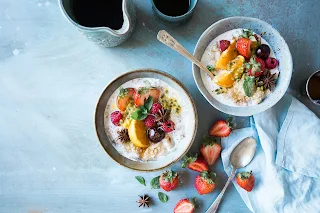In a world that's increasingly embracing the benefits of plant-based living, adopting a healthy vegetarian diet is not just a lifestyle choice but a commitment to overall well-being. Whether you're a seasoned vegetarian or considering the switch, crafting a balanced and nutritious diet is key to thriving on plant power.
1. Embrace Variety: The Colorful Plate
Aim for a diverse range of fruits, vegetables, whole grains, legumes, nuts, and seeds. Each color in your plate signifies a unique set of nutrients and antioxidants, contributing to your overall health. From vibrant berries to leafy greens, make your meals a rainbow of nutrients.
2. Protein Power: Plant-Based Sources
Contrary to common misconceptions, plant-based diets can provide ample protein. Include sources like beans, lentils, tofu, tempeh, quinoa, and edamame in your meals. These protein-packed foods not only nourish your muscles but also offer essential amino acids vital for bodily functions.
3. Whole Grains: The Foundation of Energy
Choose whole grains over refined ones for sustained energy. Brown rice, quinoa, oats, and whole wheat provide complex carbohydrates, fiber, and an array of nutrients. These grains stabilize blood sugar levels and keep you feeling fuller for longer.
4. Healthy Fats: The Heart's Best Friend
Incorporate sources of healthy fats such as avocados, nuts, seeds, and olive oil. These fats support brain function, aid in nutrient absorption, and contribute to heart health. Be mindful of portions to maintain balance.
5. Calcium and Vitamin D: Plant-Powered Bones
Ensure sufficient intake of calcium and vitamin D for bone health. Include fortified plant-based milk, tofu, leafy greens, and almonds in your diet. Adequate sun exposure also contributes to vitamin D synthesis.
6. Iron-Rich Foods: Plant Iron Absorption
While plant-based iron is non-heme and absorbed less efficiently than heme iron from animal products, pairing iron-rich foods with vitamin C enhances absorption. Enjoy iron-packed meals with citrus fruits, tomatoes, or bell peppers.
7. Hydration: Nature's Elixir
Water is the foundation of any healthy diet. Ensure you stay adequately hydrated, and consider incorporating herbal teas and infused water for added flavor and antioxidants.
8. Mindful Eating: The Art of Savory Satisfaction
Practice mindful eating by savoring each bite and paying attention to hunger and fullness cues. This approach fosters a healthy relationship with food, preventing overeating and promoting satisfaction.
9. Supplements: Bridge the Nutrient Gap
While a well-planned vegetarian diet can meet most nutritional needs, consider supplements for nutrients that may be challenging to obtain solely from plant sources, such as B12 and omega-3 fatty acids.
10. Culinary Creativity: The Joy of Plant-Based Cooking
Explore the vast world of vegetarian cuisine. Experiment with herbs, spices, and various cooking techniques to enhance flavors. This not only keeps your meals exciting but also ensures a broader spectrum of nutrients.
Remember, a healthy vegetarian diet is about nourishing your body with a rich tapestry of plant-based foods. By embracing variety, balance, and mindfulness, you can embark on a journey towards optimal health and well-being. So, let your plate be your canvas, and paint a masterpiece of nutrition and vitality!








No comments: